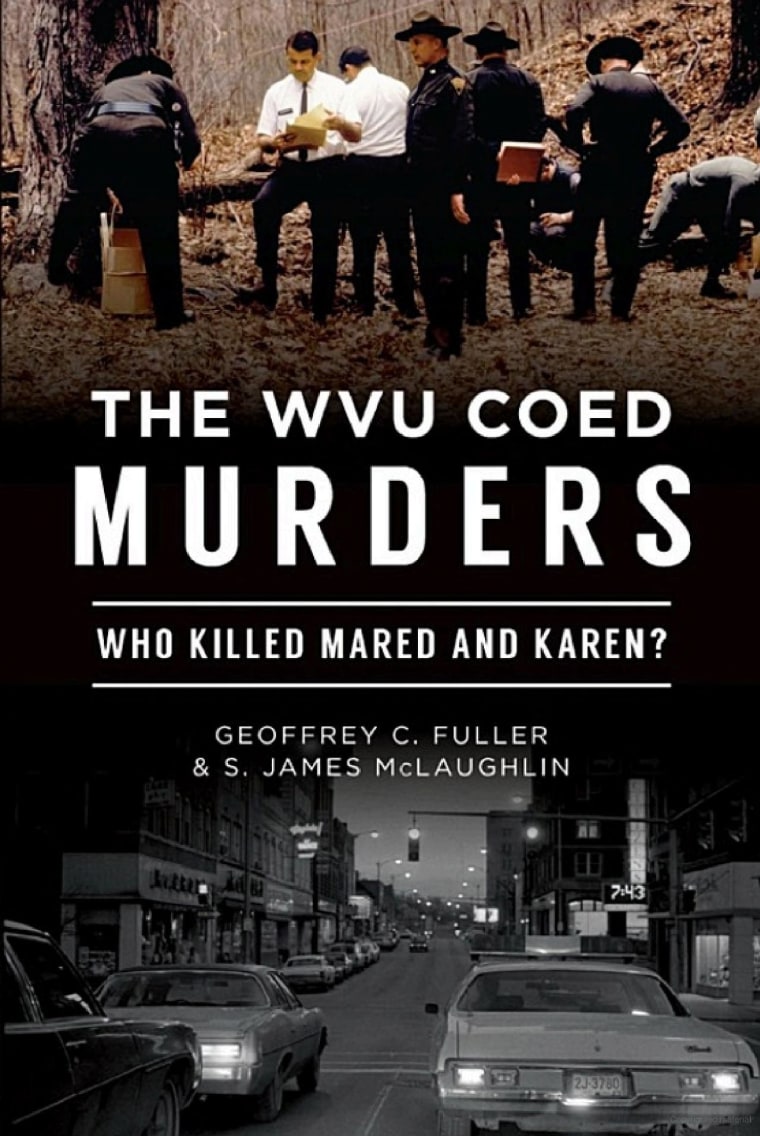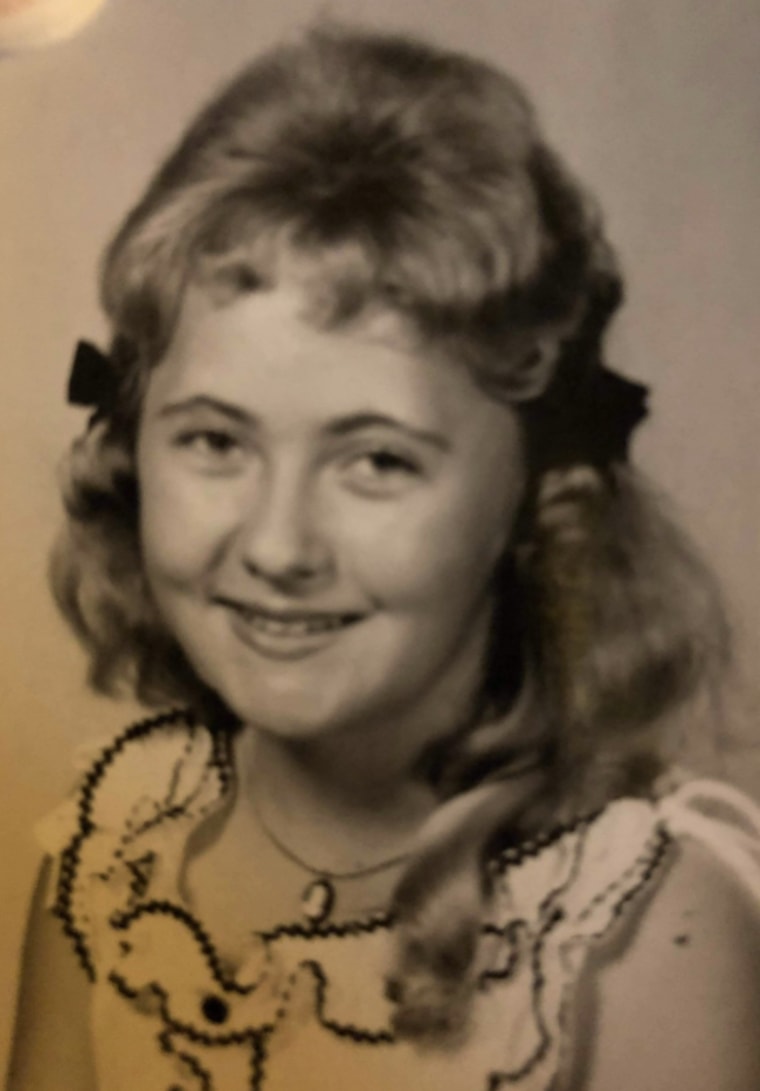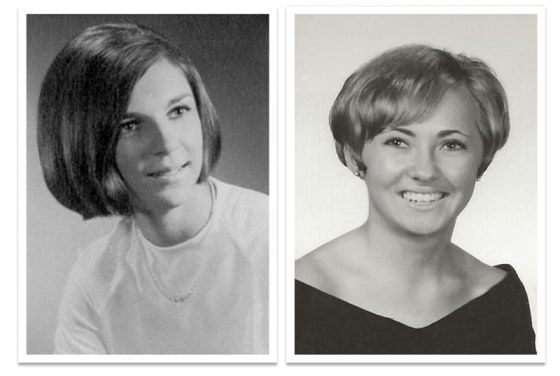It was a chilly evening in Morgantown, West Virginia.
January 18, 1970.
Mared Malarik and Karen Ferrell, two freshmen at West Virginia University, went to see the movie “Oliver!” in town. After the movie ended, a couple of friends saw them outside the theater getting in a car that then drove away.
Nick DeMedici, then a crime scene investigator with the West Virginia State Police, told Dateline it is believed that Mared and Karen were hitchhiking back to their dorm, less than a five-minute drive from the theater. DeMedici says witness reports at the time differed about what the vehicle and the driver of the car looked like.
Mared and Karen were never seen alive again.
Nearly two months later, according to DeMedici, Mared Malarik’s purse was found in a remote wooded area and turned in to the Morgantown Police Department. The case was then turned over to the West Virginia State Police.
On April 16, 88 days after Mared and Karen disappeared, their bodies were discovered by members of a National Guard unit, not far from where Mared’s purse had been recovered more than a month earlier.
Both young women had been decapitated. Their skulls have never been recovered.
Mike Kief, a former lieutenant and current crime scene specialist with the West Virginia State Police, also spoke with Dateline. “There are some questions on, you know, who did it, why they did it, why the skulls are, you know, why the heads were taken and never recovered,” he said. Kief noted that the area where the women were found was somewhere only a local would know to access. “Somebody would probably have to know that area to do that,” he said. “I just don’t think you stumble on that piece of property.”

In 2021, a book reinvigorated local interest in the case. “The WVU Coed Murders: Who Killed Mared and Karen?” is written by West Virginia natives Sarah J. McLaughlin and Geoff Fuller. The writing duo found each other while searching online for more information about the murders of the two college students. They decided to meet up and talk through the case.
Sarah and Geoff told Dateline they remember the case being talked about often as they grew up. “This was such a, you know, a brutal case,” Sarah said. “I can’t imagine any family not mentioning it,” Geoff said. “I know there was a lot of talk about ‘How could a terrible crime like that happen here?’”
The book caught Nick DeMedici’s attention. “The work that they have done is nothing short of impressive,” he said. “Having seen large-scale criminal investigations into homicides, the work that these two did with just the resources they had available to them as just individuals in the public was impressive.”
One thing Sarah and Geoff focused on was a series of anonymous letters sent to the West Virginia State Police shortly after the bodies were found that gave clues to where the skulls might be found.
In Nick DeMedici’s opinion, the letters created a bit of tunnel vision when it came to suspects. “They were hyper-fixated on these letters,” he said. While he believes the writer of the letters was well-intentioned, “in my opinion, they damaged the investigation,” DeMedici said.
In their research, authors Sarah McLaughlin and Geoff Fuller learned the letters were later connected to a man named Richard Warren Hoover of the Psychic Science Church in Maryland. Sarah says Hoover freely admitted to being the author of the letters and said he had gotten the information during a séance he was holding for a friend. Authorities did not pursue Hoover as a suspect in the case.
Sarah and Geoff also looked into Karen and Mared’s backgrounds. Sarah says Mared Malarik grew up in New Jersey. After the disappearance, some of Mared’s family members flew down to Morgantown. Sarah says the family has not been in the public eye since the ‘70s. The writers have not been able to contact any of Mared’s relatives nor has Dateline.
Dateline spoke with Karen Ferrell’s childhood best friend, Freda Nottingham Moore, who says she and Karen were more like sisters than friends. Even her parents felt that way. “They loved her just as much as I did, and she just became like a part of our household.” Freda described her friend as “bubbly, smart, kind and understanding.”
After a bit of searching, Sarah McLaughlin and Geoff Fuller were able to locate one of Karen Ferrell’s relatives — her cousin Holly Naylor. Dateline also spoke with her. Holly says her aunt and uncle, Bess and Richard Ferrell, had been unable to have biological children. They adopted Karen and doted on her. “She was a very loved child,” Holly said.

While Holly hadn’t yet been born when her cousin died, she says she learned a lot about Karen through the journals and photos she left behind. “Just reading through those, you can tell she was just a typical, you know, teenage girl,” Holly said. “Crushed on boys and was very social.”
While Karen and Mared had only met that freshman year, “my understanding was they were friends. Good friends,” Holly said.
Unfortunately, the case of the murdered coeds quickly grew cold after their bodies were found. Police interviewed the young women’s friends, students at the university, and other locals, but few leads were generated in the case.
Then, in 1976 -- six years after the murders -- a man named Eugene Paul Clawson confessed to the killings. Clawson, who was already incarcerated for an unrelated sex crime at the time, was tried and convicted in the case. Eventually he recanted his confession and appealed his conviction.
According to case records, the appeal was granted in November 1977. On March 11, 1980, Clawson’s argument was heard by the Supreme Court of Appeals of West Virginia. In his argument, Clawson claimed he did not waive his rights to have counsel present when giving his confession. Additionally, he alleged that the denial of his motion for a change of venue for the trial negatively affected the outcome of the case. He also asserted that “certain photographs of the bodies of the two victims of the crime should not have been admitted as they were extremely gruesome, highly inflammatory and lacking in probative value.” Without ruling on the other issues, the court concluded that certain photographs had “no probative value and were clearly gruesome and their introduction created reversible error.” The conviction was overturned and the case remanded.
In 1981 — more than a decade after the murders — Clawson went on trial for the murders again. According to an article by the Associated Press, published in the Asbury Park Press newspaper, Clawson was again found guilty. When asked if he would like to address the court before sentencing, Clawson said, ‘The only thing I have to say to the court is I didn’t kill the two coeds.’ He was sentenced to life in prison.
Clawson died in custody in 2009.
Geoff Fuller, co-author of “The WVU Coed Murders: Who Killed Mared and Karen?” told Dateline that when going through Clawson’s initial confession, they found many details that didn’t match up. “[Clawson] cites, I think we tallied up, 30-something things in his confession that matched the articles we found -- and did not match the facts of the case,” Geoff said. Former lieutenant Mike Kief corroborated this for Dateline, but would not elaborate on what the inconsistent details were. “He had some psychological problems,” Kief said of Clawson. He added that investigators did not find Clawson credible, and he thinks investigators did not believe Clawson was in the area at the time of the murders.
Authors Sarah McLaughlin and Geoff Fuller do not believe Clawson is responsible for Mared and Karen’s deaths. They delve into the case in their book, and season 1 of the podcast “Appalachian Mysteria.”
They say they remain committed to continuing to follow the case. “We still think that somebody knows something,” Geoff told Dateline. “It would be nice if it got wrapped up.” But he added he sometimes worries that “maybe it’s just been too long.”
In the 55 years since the young women were murdered, there have been many different theories as to who might have done this to Karen and Mared. According to former crime scene investigator Nick DeMedici, authorities brought in a few other people for questioning. But due to a lack of evidence, they were never able to move forward with any other suspects.
According to Mike Kief, in 2022, teams were sent to dig through more than 50 years’ worth of soil in a spot authorities identified as an area of interest in the case. They purchased a ground-penetrating radar device to use as they combed the area. “The problem is that area out there, of course, like any other part of West Virginia, has been heavily mined, and now the terrain and the ground doesn’t look like it did back in the ‘70s,” he said. Kief says the results were “limited” as the data is difficult to decipher.
Karen Ferrell’s cousin Holly Naylor says she is just looking to get the closure for which her aunt Bess and uncle Richard were so desperate. After Karen’s murder, “her parents were just never the same,” Holly said. “Her mother had spent years trying to find justice.” Bess and Richard Ferrell were also desperate for something else. “They wanted her to be whole,” Holly explained. “They had to die not having that closure, not knowing what truly happened, who truly did it, and where her head is.”
Karen’s childhood best friend Freda Nottingham Moore is also hoping for closure. “But not so much that no one ever remembers her,” she said. “I want her to be remembered.”
If you have any information regarding the murders of Karen Ferrell and Mared Malarik please contact the West Virginia State Police at 304-746-2100.
If you have a story to share with Dateline, please submit it here.
Editor's Note: This article has been updated to correct the year Clawson died.
